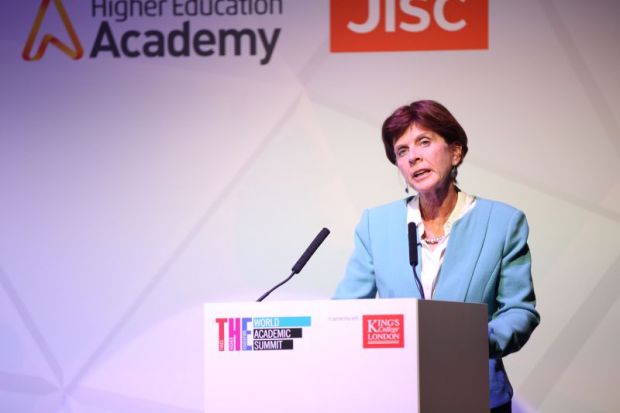The vice-chancellor of the University of Oxford has warned that “mendacious media and tawdry politicians” are determined to undermine the British higher education sector, and has called on academics around the world to resist the “acceptance of a post-truth world”.
Speaking at the Times Higher Education World Academic Summit, held at King’s College London, Louise Richardson warned that the future prosperity of the UK's higher education sector was being endangered by frenzied debate about tuition fees and vice-chancellors’ salaries.
“We have been getting a rough ride lately, and certainly some mendacious media and tawdry politicians seem determined to do their utmost to damage one of the most successful – and globally admired – sectors of the British economy,” she said.
Answering a question from the Press Association after her address, Professor Richardson said it was "completely mendacious" of politicians "to suggest that vice-chancellors have raided the £9,000 fee to enhance their own salaries".
“We know that the £9,000 fee was to substitute for the withdrawal of government funding," she said.
Professor Richardson said her own pay, which she put at £350,000, was “a very high salary compared to our academics”. But she said that vice-chancellors “operate in a global marketplace” and university presidents’ salaries in the US are far higher.
She said that she hoped that the "spurious" correlations between fees and executive salaries would end, "not because it’s embarrassing for me and my colleagues, but because it’s damaging" to the reputation of UK higher education.
In her speech, Professor Richardson said that the reduction of public funding for higher education in many countries worldwide, and the increase in tuition fees to make up for the shortfall, was damaging.
“This is leaving students with significant debt which will inevitably affect their career choice, but it also spreads the notion that students are consumers with all the implications that has for their relationship with their university," Professor Richardson said.
Professor Richardson described comments made by the new chairman of the UK’s Education Select Committee, Robert Halfon, that the whole purpose of going to university and taking out the associated loan was to get a high-paid job at the end of it, as “extraordinary”.
“It seems to me that Mr Halfon has completely missed the point of going to university, but unfortunately he is not alone,” she said.
Professor Richardson admitted that the situation in the UK was “pale in comparison” to Turkey, where the government has closed campuses and fired thousands of academics following a failed coup, or in Hungary, where prime minister Viktor Orbán has rushed through legislation designed to force the Central European University to close.
"One of the most troubling aspects” of recent election results around the world, Professor Richardson continued, was “the gap they revealed between universities and the rest of the country”, highlighting how large numbers of voters for Brexit and US president Donald Trump did not have a university degree. “This is potentially a real problem for universities who rely on public support for our ability to operate,” she added.
Professor Richardson concluded: “If we are to maintain public support we must be – and be seen to be – fair in our admissions procedures, transparent in our governance, consistent in our defence of the principles we espouse. And we must vehemently resist alternative facts and the acceptance of a post-truth world.”




